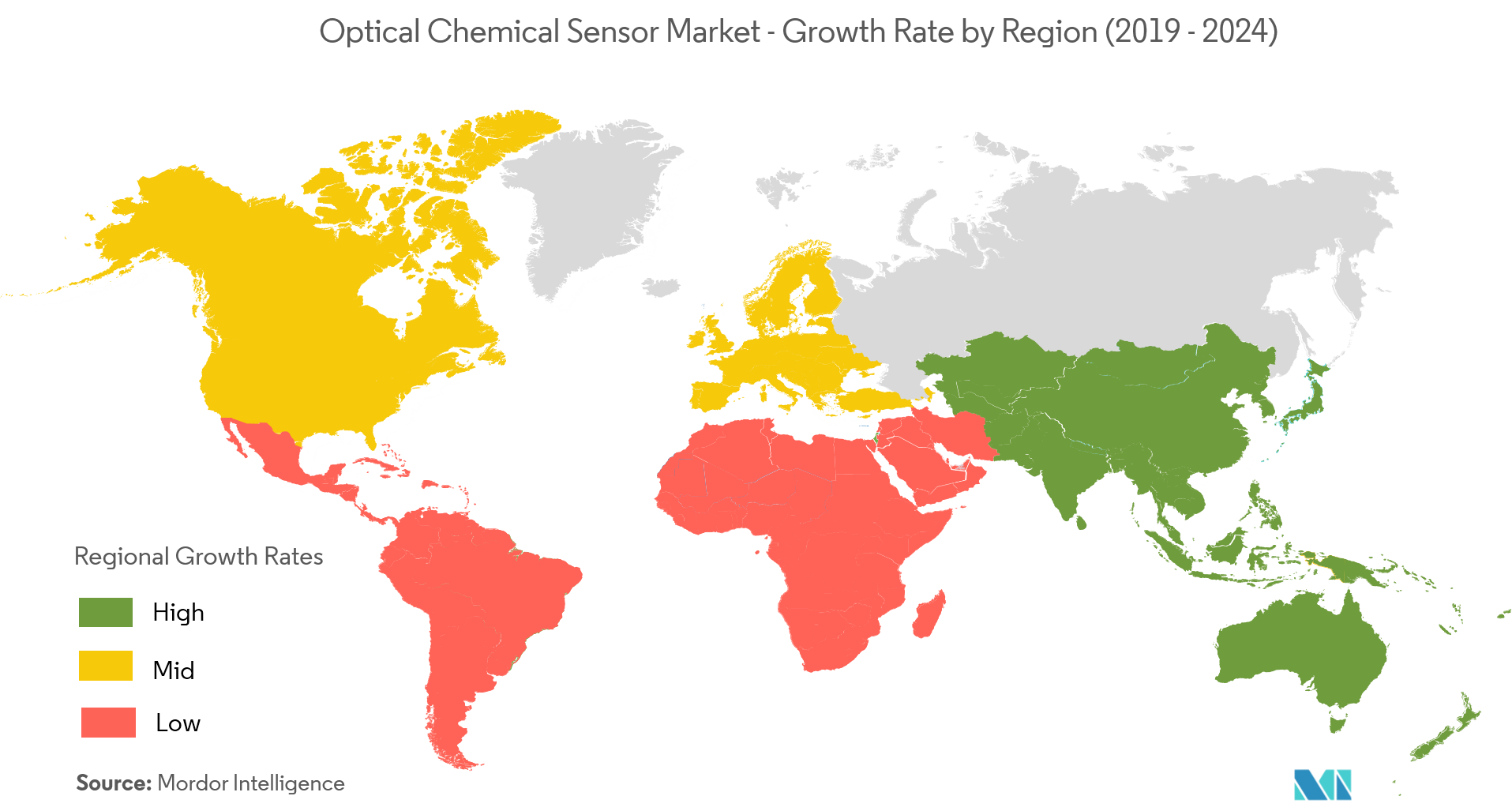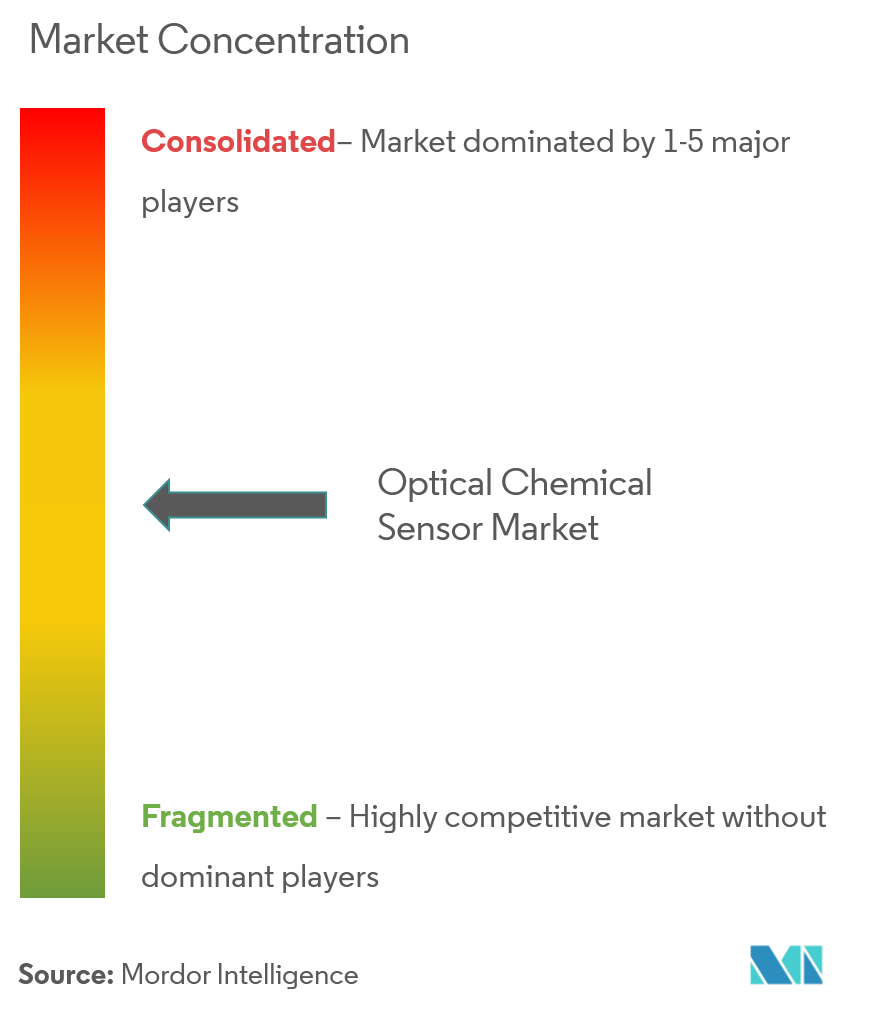
Optical Chemical Sensor Market Analysis
The Optical Chemical Sensor Market is expected to register a CAGR of 17.57% during the forecast period.
- Optical chemical sensors perform the detection of specific chemicals that cannot be detected by other technologies present in the market. They are comparatively easy to miniaturize, they are sensitive, and can operate in water, air, corrosive liquids, organic solvents, and soil.
- Optical chemical sensors have replaced the traditional and conventional electronic sensors due to various advantages over them, such as selectivity, immunity to electromagnetic interference, and safety while working with flammable and explosive compounds. They are also inexpensive, non-destructive, and have many capabilities.
- These advantages over the traditional sensors have driven the attention of the sensor manufacturers to the optical chemical sensors. Moreover, enterprises, such as Siemens have included these sensors in their product offerings, providing the manufacturers with tremendous potential.
- However, despite a number of advantages, optical sensors also have some disadvantages, such as ambient light, which can interfere with their operation. Also, their long-term stability is limited due to indicator leaching or photobleaching.
Optical Chemical Sensor Market Trends
Medical Sector to Witness High Growth
- The rising demand for the next generation of clinical diagnostics, measuring and monitoring sensors for applications in implantable and wearable devices have created huge opportunities with exponential growth potential for the market.
- Chemical sensing array and higher order orthogonal sensors are significant trends in the global market. Particularly in bio-sensing, advancements in micro fluids, and imaging technology are the primary driving factors of optical chemical sensors market.
- With less raw material usage and the emergence of nano and microfabrication techniques within the industrial manufacturing process have led to a substantial increase in the commercialization of optical chemical sensors for healthcare applications and is expected to stay steady during the forecast period.
- With the increasing R&D expenditure by industry players in the medical technology, it is expected to drive the market for optical medical sensors forward.

North America Occupies a Significant Share in the Market
- Owing to the rising healthcare expenditure and the increasing incidence of diseases in this region, the United States is expected to contribute significantly to the optical chemical sensors and biosensors market. This is owing to the miniaturization, the carbon-nanotube-based optical sensor can detect a specific protein found on the membrane of chronic myeloid leukemia cells.
- Additionally, optical chemical (gas) sensors provide a good alternative over the conventional conductometric gas sensors. They are found to be highly sensitive with a very fast response towards a wide concentration range (0.5 to 100 ppm) of CO gas at room temperature and hence creates the way for the commercial application of an efficient optical CO gas sensor.
- Moreover, the US government has introduced mandatory regulations to compel the adoption of CO gas leak detector in every house. The awareness campaign about the harmful effects of poisonous carbon monoxide (CO) through the national fire protection association (NFPA) and the US Consumer Product Safety Commission (CPSC) is further driving the growth of the market.

Optical Chemical Sensor Industry Overview
The optical chemical sensor market is highly competitive owing to the presence of many small and large players in the market operating their business. The market appears to be moderately concentrated and the key strategies adopted by the major players in the market are product innovation and mergers and acquisition. Someof the major players in the market areHoneywell International Inc.,Emerson Electric Company,ABB Ltd,Robert Bosch GmbH.
- January 2018 -Siemens building technologies division introduced a dust sensor which can be utilized in buildings, rounding out its product offering for a healthy indoor climate. The sensor can be used to monitor and visualize particle pollution and is easy to integrate into building management systems.
Optical Chemical Sensor Market Leaders
-
Honeywell International Inc.
-
Emerson Electric Company
-
ABB Ltd
-
Robert Bosch GmbH
-
Siemens AG
- *Disclaimer: Major Players sorted in no particular order

Optical Chemical Sensor Industry Segmentation
Optical chemical sensors are defined as miniaturized devices that can transfer real-time and on-line information on the detection of specific compounds or ions in a complex sample. The most widely used techniques utilized in the optical chemical sensor are optical absorption and luminescence.
| By End-user Industry | Industrial |
| Medical | |
| Environmental Monitoring | |
| Defense and Homeland Security | |
| Other End-user Industries | |
| Geography | North America |
| Europe | |
| Asia-Pacific | |
| Latin America | |
| Middle East & Africa |
Optical Chemical Sensor Market Research FAQs
What is the current Optical Chemical Sensor Market size?
The Optical Chemical Sensor Market is projected to register a CAGR of 17.57% during the forecast period (2025-2030)
Who are the key players in Optical Chemical Sensor Market?
Honeywell International Inc., Emerson Electric Company, ABB Ltd, Robert Bosch GmbH and Siemens AG are the major companies operating in the Optical Chemical Sensor Market.
Which is the fastest growing region in Optical Chemical Sensor Market?
Asia Pacific is estimated to grow at the highest CAGR over the forecast period (2025-2030).
Which region has the biggest share in Optical Chemical Sensor Market?
In 2025, the North America accounts for the largest market share in Optical Chemical Sensor Market.
What years does this Optical Chemical Sensor Market cover?
The report covers the Optical Chemical Sensor Market historical market size for years: 2019, 2020, 2021, 2022, 2023 and 2024. The report also forecasts the Optical Chemical Sensor Market size for years: 2025, 2026, 2027, 2028, 2029 and 2030.
Our Best Selling Reports
Optical Chemical Sensor Industry Report
Statistics for the 2025 Optical Chemical Sensor market share, size and revenue growth rate, created by Mordor Intelligence™ Industry Reports. Optical Chemical Sensor analysis includes a market forecast outlook for 2025 to 2030 and historical overview. Get a sample of this industry analysis as a free report PDF download.



